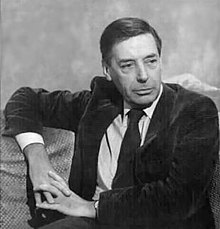
Back بيرنارد ويليامز Arabic Bernard Williams Catalan Bernard Williams Czech Bernard Williams German Bernard Williams Spanish Bernard Williams Estonian برنارد ویلیامز Persian Bernard Williams (filosofi) Finnish Bernard Williams French ברנארד ויליאמס HE
Bernard Williams | |
|---|---|
 | |
| Born | Bernard Arthur Owen Williams 21 September 1929 Westcliff-on-Sea, England |
| Died | 10 June 2003 (aged 73) Rome, Italy |
| Education | Balliol College, Oxford |
| Spouses |
|
| Era | Contemporary philosophy |
| Region | Western philosophy |
| School | Analytic philosophy, Postanalytic philosophy |
| Institutions | |
| Academic advisors | Gilbert Ryle |
| Notable students | Myles Burnyeat, Tim Mulgan, Jonathan Sacks, Martha Nussbaum |
Main interests | Ethics |
Notable ideas | Internal reasons for action, moral luck, dirty hands |
Sir Bernard Arthur Owen Williams, FBA (21 September 1929 – 10 June 2003) was an English moral philosopher. His publications include Problems of the Self (1973), Ethics and the Limits of Philosophy (1985), Shame and Necessity (1993), and Truth and Truthfulness (2002). He was knighted in 1999.
As Knightbridge Professor of Philosophy at the University of Cambridge and Deutsch Professor of Philosophy at the University of California, Berkeley, Williams became known for his efforts to reorient the study of moral philosophy to psychology, history, and in particular to the Greeks.[1][2] Described by Colin McGinn as an "analytical philosopher with the soul of a general humanist,"[3] he was sceptical about attempts to create a foundation for moral philosophy. Martha Nussbaum wrote that he demanded of philosophy that it "come to terms with, and contain, the difficulty and complexity of human life."[4]
Williams was a strong supporter of women in academia; according to Nussbaum, he was "as close to being a feminist as a powerful man of his generation could be."[5] He was also famously sharp in conversation. Gilbert Ryle, one of Williams's mentors at Oxford, said that he "understands what you're going to say better than you understand it yourself, and sees all the possible objections to it, and all the possible answers to all the possible objections, before you've got to the end of your own sentence."[6]
- ^ Mark P. Jenkins, Bernard Williams, Abingdon: Routledge, 2014 [2006], 3.
- ^ Colin Koopman, "Bernard Williams on Philosophy's Need for History," The Review of Metaphysics, 64(1), September 2010, 3–30. JSTOR 29765339
- ^ McGinn, Colin (10 April 2003). "Isn't It the Truth?". New York Review of Books. ISSN 0028-7504. Archived from the original on 8 May 2021. Retrieved 3 February 2024.
- ^ Martha C. Nussbaum, "Tragedies, hope, justice," in Daniel Callcut (ed.), Reading Bernard Williams, Abingdon: Routledge, 2009, 213.
- ^ Martha C. Nussbaum, "Tragedy and Justice" Archived 8 December 2004 at the Wayback Machine, Boston Review, October/November 2003.
- ^ Magee, Bryan (1998). Confessions of a philosopher. Internet Archive. London : Phoenix. p. 104. ISBN 978-0-7538-0471-1 – via Internet Archive.